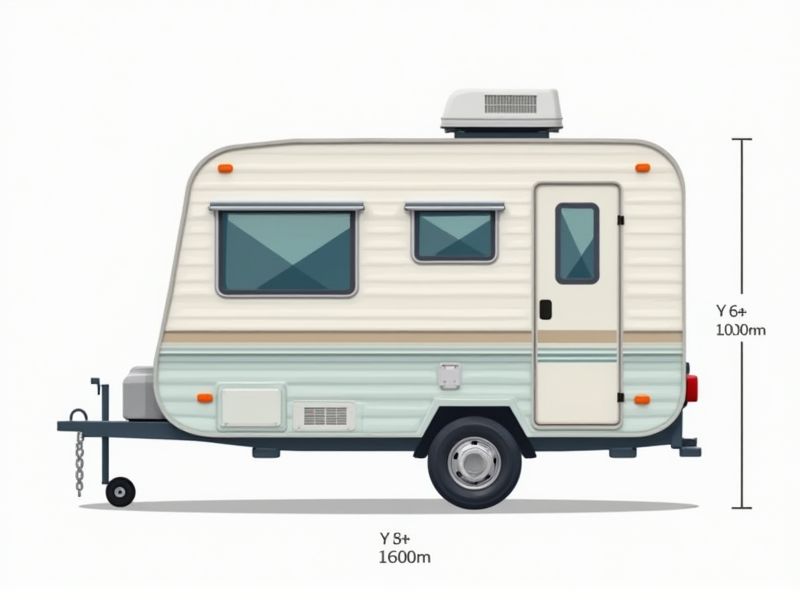
When considering camper trailers, standard dimensions can help you choose the right fit for your needs. Most single-axle camper trailers typically measure between 12 to 20 feet in length, with a width of about 7 to 8 feet and a height around 8 to 10 feet including the roof. These dimensions provide enough living space while staying compact enough for easier towing and maneuverability. When planning your purchase, always confirm the interior and exterior dimensions with the manufacturer, as custom layouts may affect the available space.
Length
Camper trailers typically range from 10 to 20 feet in length, optimizing both maneuverability and interior space. A compact 12-foot model is ideal for singles or couples, offering convenient storage and easy towing. In contrast, a larger 18-foot trailer accommodates families, featuring added amenities like multiple sleeping areas and kitchen facilities. When choosing a camper trailer, consider how the length impacts your driving experience and overall comfort during travels.
Width
The standard width for most camper trailers typically ranges from 6 to 8 feet, accommodating various camping needs while ensuring road safety. A width of 7 feet serves as an optimal choice, providing ample interior space without compromising maneuverability. When selecting a camper trailer, consider how this width affects towing capacity, which often varies between 3,500 to 8,000 pounds depending on the model. Maintaining a balance between width and total weight is essential for your driving experience and overall stability on the road.
Height
A camper trailer's height is typically designed to optimize aerodynamics and stability, with most models ranging between 6 to 10 feet tall when fully set up. The ideal height ensures easy towing, allowing you to navigate under bridges and through low-clearance areas effectively. In addition, a proper height facilitates comfortable access to your living space, making it easier for you and your family to enter and exit. When selecting a camper trailer, consider the height specifications to ensure it meets your needs for both travel and campsite functionality.
Weight
The optimal weight for a camper trailer typically ranges from 1,500 to 3,500 pounds, balancing portability and durability. Lightweight designs often utilize materials such as aluminum or composite panels, contributing to enhanced fuel efficiency during travel. A trailer's weight directly influences towing ease and vehicle compatibility; for example, ensure your vehicle's towing capacity supports the trailer's loaded weight. Choosing a trailer under 2,500 pounds can improve maneuverability and allow for a wider range of tow vehicles, giving you more options for adventures.
Axle Count
The axle count of a camper trailer plays a crucial role in determining its load capacity and stability, with most standard trailers typically featuring either one or two axles. A single axle configuration is lighter and easier to maneuver, making it ideal for smaller trailers weighing between 1,000 to 3,500 pounds. Conversely, dual axle trailers can bear heavier loads of up to 7,000 pounds, providing better weight distribution and enhanced towing stability. When choosing a camper trailer, consider your towing vehicle's capabilities, as this will ensure a safe and efficient travel experience.
Ground Clearance
Ground clearance is a critical factor for camper trailers, typically ranging from 8 to 12 inches, ensuring safe navigation over rough terrains. A higher ground clearance minimizes the risk of undercarriage damage while providing better approach and departure angles, essential for off-road adventures. When choosing a camper trailer, prioritize models with reinforced suspension systems that offer durability while maintaining the necessary height. Investing in a trailer with adjustable ground clearance can enhance your overall camping experience, allowing you to tackle varied landscapes with confidence.
Hitch Height
The optimal hitch height for camper trailers typically ranges from 17 to 20 inches, depending on the trailer's design and vehicle type. A properly adjusted hitch height ensures a level trailer for safe towing, minimizing sway and enhancing stability on the road. For effective towing, it's crucial to match the hitch height with your vehicle's receiver height, which is often around 13 to 17 inches for many trucks and SUVs. Ensuring this alignment can significantly improve your camping experience by providing better handling and reducing the likelihood of trailer damage.
Interior Space
When evaluating camper trailers, prioritize models with spacious interior layouts that maximize comfort during your travels. Look for designs that feature slide-outs, which can increase living area by up to 30%, providing extra room for seating and storage. A well-planned interior should also include amenities like kitchenette spaces, dining areas, and sleeping quarters, often accommodating 4 to 6 people comfortably. Opt for trailers with high ceilings, usually around 6 feet 5 inches, which create an open feel and allow for easy movement throughout the space.
Slide-Out Dimensions
When evaluating camper trailer standards, slide-out dimensions play a critical role in determining space efficiency and usability. Most modern camper trailers feature slide-outs that range from 2 to 4 feet in width, significantly expanding living areas when deployed. Optimal slide-out configurations can add up to 50% more interior space, enhancing comfort for you and your family during trips. Ensuring that slide-outs are properly engineered for ease of use and durability is essential, often leading to brands with a reputation for quality craftsmanship in the camping community.
Towing Capacity
Towing capacity is a critical factor when selecting a camper trailer, as it determines the maximum weight your vehicle can safely tow. Most modern vehicles have a towing capacity ranging from 1,000 to 10,000 pounds, influencing your choice of trailer size and camping gear. A camper trailer typically weighs between 1,500 and 3,500 pounds, so ensuring your vehicle's towing capacity exceeds this weight is essential for safety and performance. Understanding these specifications helps you maximize your camping experience while ensuring compliance with road regulations.
